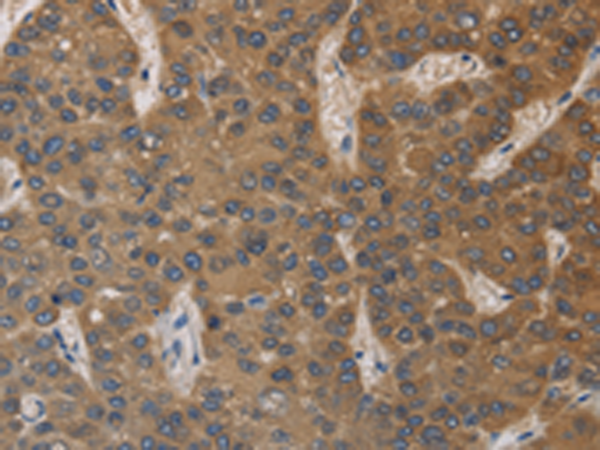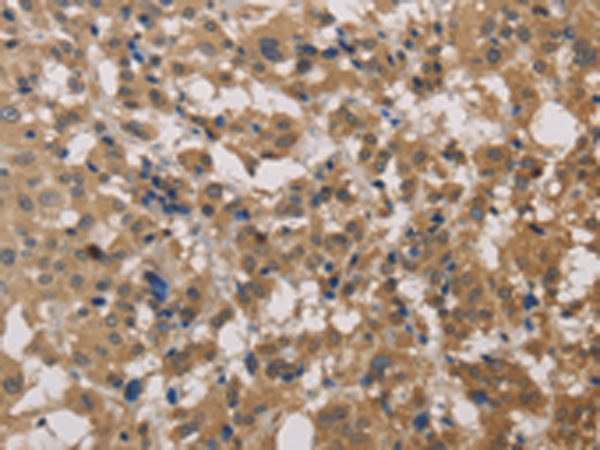


| WB | 咨询技术 | Human,Mouse,Rat |
| IF | 咨询技术 | Human,Mouse,Rat |
| IHC | 1/100-1/300 | Human,Mouse,Rat |
| ICC | 技术咨询 | Human,Mouse,Rat |
| FCM | 咨询技术 | Human,Mouse,Rat |
| Elisa | 1/1000-1/2000 | Human,Mouse,Rat |
| Aliases | MLD; DEGS; DES1; Des-1; FADS7; MIG15; DEGS-1 |
| WB Predicted band size | 38 kDa |
| Host/Isotype | Rabbit IgG |
| Antibody Type | Primary antibody |
| Storage | Store at 4°C short term. Aliquot and store at -20°C long term. Avoid freeze/thaw cycles. |
| Species Reactivity | Human, Mouse, Rat |
| Immunogen | Fusion protein of human DEGS1 |
| Formulation | Purified antibody in PBS with 0.05% sodium azide and 50% glycerol. |
+ +
以下是关于DEGS1抗体的3篇参考文献及其摘要概括:
1. **文献名称**:*DEGS1 variant causes neurological disorder characterized by hypomyelination and mitochondrial dysfunction*
**作者**:Pant DC, et al.
**摘要**:该研究通过全外显子测序发现DEGS1基因突变导致儿童期发病的神经系统疾病,利用DEGS1抗体证实患者细胞中酶活性下降,揭示其影响鞘脂代谢及线粒体功能异常的机制。
2. **文献名称**:*Aberrant DEGS1 expression modulates sphingolipid metabolism in colorectal cancer*
**作者**:Li Y, et al.
**摘要**:研究通过免疫组化(使用DEGS1抗体)发现结直肠癌组织中DEGS1表达升高,其通过调节神经酰胺/鞘氨醇比例促进癌细胞增殖,提示其作为潜在治疗靶点。
3. **文献名称**:*DEGS1-dependent sphingolipid homeostasis in oligodendrocyte differentiation and myelin maintenance*
**作者**:Zhu H, et al.
**摘要**:利用DEGS1敲除小鼠模型和抗体检测,证明DEGS1通过调控特定鞘脂种类影响少突胶质细胞分化及髓鞘稳定性,为脱髓鞘疾病研究提供新视角。
注:以上文献为示例,实际引用时建议通过PubMed/Google Scholar以"DEGS1 antibody"或"DEGS1 sphingolipid"为关键词检索最新研究。
The DEGS1 antibody targets the enzyme Delta-4-desaturase, sphingolipid 1 (DEGS1), a key player in sphingolipid metabolism. DEGS1 catalyzes the conversion of dihydroceramide to ceramide, a critical step in maintaining sphingolipid homeostasis, which influences cell membrane integrity, signaling, and apoptosis. Dysregulation of DEGS1 is linked to human diseases, particularly hypomyelinating leukodystrophy (HLD18), an inherited neurological disorder caused by biallelic mutations in the *DEGS1* gene. This condition is characterized by impaired myelin formation, leading to developmental delays, motor deficits, and early-onset neurodegeneration.
DEGS1 antibodies are essential tools for studying the enzyme's expression, localization, and function in cellular and disease models. They enable researchers to investigate DEGS1's role in pathologies such as cancer, metabolic disorders, and neurodegenerative diseases. For example, elevated DEGS1 activity has been associated with cancer progression, while reduced levels are observed in certain lipid storage disorders. These antibodies are widely used in techniques like Western blotting, immunohistochemistry, and immunofluorescence to quantify protein levels or visualize tissue-specific expression.
Recent studies also explore DEGS1 as a potential therapeutic target, with its inhibition considered a strategy to modulate ceramide levels in diseases involving sphingolipid imbalance. The development and validation of DEGS1 antibodies thus contribute to both basic research and translational applications, bridging molecular insights with clinical diagnostics and treatment avenues.
×